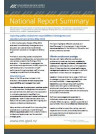This report discusses the effectiveness of employment practices in some kindergartens and education and care services.
Purpose
In 2013 the Education Review Office (ERO) evaluated how effectively kindergartens and education and care services implemented employment practices to manage and develop staff. The data for this evaluation was gathered as part of the regular education reviews of 235 services in Term 2, 2013.
This report presents ERO’s findings in relation to:
- recruitment and appointment of staff
- support for ongoing staff development
- improvement of staff performance through appraisal processes
- staff turnover, managing complaints about staff and police vetting.
Methodology
Evaluation questions
ERO evaluated how effectively each service managed and developed its staff. ERO focused on:
- how well the service managed the recruitment and appointment of staff
- how well the service supported ongoing staff development
- how effectively the service’s appraisal processes improved staff performance.
More detail about these areas for investigation is set out in the indicators ERO used to make judgements about the services’ commitment and capability to implement employment practices that appoint, manage and develop competent staff. [15]
ERO also collected supporting information about:
- the nature and extent of staff turnover in the last two years
- the management of complaints about staff, including mandatory reporting to the NZTC
- the police vetting of all staff and volunteers.
Data gathering
ERO gathered data from 235 early childhood services that were reviewed in Term 2 2013. ERO collected information from a variety of sources including:
- management of the service
- teachers/ staff at the service
- observations of interactions
- documents related to the operations of the service, including self-review information.
This report does not include home-based education and care service and Playcentres. Home-based education and care services are not included because ERO only reviewed a small number (10) of home-based services in Term 2, 2013 when data for this evaluation was gathered. Playcentres are not included because they are generally not involved in employing a large number of staff.
Key Results
Effective employment practices aim to develop, strengthen and make the best use of staff skills and knowledge to enhance teaching practice and maximise the safety and learning for all children. Many of the services in this evaluation were aware of their employment responsibilities and managed them well. Where ERO identified aspects of practice that needed improvement, service providers and managers were mostly responsive and took action to address matters raised. In services that were struggling with employment practices, poor leadership and a lack of robust self review were contributing factors.
Kindergartens and education and care services that were part of an umbrella organisation benefited from comprehensive employment-related policies and procedures. Staff in these services were more likely to be very well supported with ongoing and relevant professional development.
Where ERO found highly effective employment practices, services had up-to-date policies to guide practice and robust systems for regular review of policies that focused on alignment with practice. Managers and leaders had the capacity and commitment to recruit, manage and develop competent staff.
Most services managed recruitment and appointment processes well. Where improvements were needed, these related to consistency of implementation and/or regular review of policies and processes. Poor leadership was a factor in services that were not managing recruitment and appointment processes well. In a few services, processes to verify qualifications and conduct referee checks were not always carried out. This posed a potential risk in terms of children’s safety and wellbeing.
Most early childhood services in this evaluation provided good induction and professional development support for staff. In some services, clear links between the service’s vision, strategic plan and goals, professional development, and appraisal goals contributed to improved teaching practice. In other services, professional development was ad hoc, lacked a strategic focus and was not aligned to appraisal goals. Staff in these services were not well supported to improve their teaching practice.
Where ERO identified highly effective appraisal practices the focus was on systematically developing staff and improving teaching practice. In these services, well-documented processes were aligned to the Registered Teacher Criteria (RTC), included teacher reflection, and observation and regular monitoring of progress towards identified goals. However, in many services, appraisals were a one off activity rather than an ongoing process. In these services, appraisal was not necessarily viewed as a professional activity to improve and develop practice.
ERO’s findings highlight the need for appraisal processes to be embedded in a performance management system focused on building staff capability and improving teaching practice. Appraisal goals need to be linked to the service’s vision, strategic plan and goals, and professional development to have the greatest impact on teaching and learning outcomes for children.
ERO found that early childhood services were managing a range of complaints about staff from both internal and external sources. Services were often managing these complaints through a ‘one-size-fits-all’ policy where the same processes were applied for minor issues and serious misconduct. Although most services were aware of the New Zealand Teachers Council (NZTC) mandatory reporting requirements, ERO found instances where complaints about staff were not reported to the NZTC. As mandatory reporting applies only to registered teachers, services are currently not required to report on issues associated with the competence or conduct of staff who are not registered. The Ministry of Education should consider whether services might be expected to report on the conduct and competence of staff who are not registered teachers and how this could be addressed.
Most services were aware of and had appropriate procedures for police vetting. Where ERO identified issues with police vetting these related to the lack of details to guide the process, services unaware of the requirement to vet staff every three years, or nonregistered staff not being police vetted.

